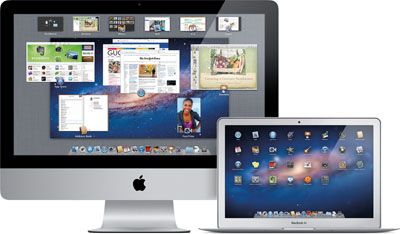- Qualcomm Launches Snapdragon 4 Gen 2 Mobile Platform
- AMD Launches Ryzen PRO 7000 Series Mobile & Desktop Platform
- Intel Launches Sleek Single-Slot Arc Pro A60 Workstation Graphics Card
- NVIDIA Announces Latest Ada Lovelace Additions: GeForce RTX 4060 Ti & RTX 4060
- Maxon Redshift With AMD Radeon GPU Rendering Support Now Available
Apple Announces OS X 10.7 ‘Lion’
Apple introduced a lot of software at its ongoing WWDC conference that gives fans reason to be excited, but for desktop users, it’s OS X Lion that’s proven to be the most interesting. Like Snow Leopard, Lion’s upgrade price is set to $29.99, and as such, the OS is more of an upgrade that’s stuck in the middle of being a service pack and a full-blown OS release. For the price, though, there could be a couple of reasons worth upgrading.
Ever wish that a desktop PC felt like a mobile one? Well, with “Multi-Touch Gestures” introduced in Lion, we’re one step closer. Similar to the touch gestures on the MacBook line-up, Lion will allow its users quick swipes of their fingers (with compatible peripheral) to switch between apps, scroll pages, zoom in, and so forth. Using three fingers to scroll upward on the touchpad will ignite “Mission Control”, a cascade of sorts that shows you every application you have open in an easy-to-navigate manner.
On the surface, “full-screen apps” seems like an attempt at Apple to put anything new into Lion, but apparently there’s been a lot of demand for them because they seem to be worth touting. This isn’t a simple maximize feature, but rather refers to Apple’s own applications, such as Mail, Photo Booth, Safari, Pages and others, having native full-screen modes that take up the entire display, as the name suggests.
In what I’m sure is the first major step to make OS X look like a mobile device, “Launchpad” has also been introduced, which is not unlike the app-viewers within both Ubuntu’s Unity and GNOME 3.0. All installed applications will be displayed in a grid and can simply be clicked to be opened. In a way, you could consider this to be a dock extender, or a way to remove some of the shortcuts on your dock if you want to keep things looking a bit cleaner.
In addition to the features mentioned above, Apple has also brought a “Resume” feature to Lion, which allows you to reboot without having to close down any of your open applications. Upon hitting the desktop again, all of the applications will open right back up with their same orientations. Extending also file security, another feature called “Auto Save” will automatically back up documents on a regular basis to make sure that you never lose work due to a power failure or an accidental closing of a document without saving it first. Similar to Time Machine, month’s worth of backups can exist, so if you need to go way back in time for data you’ve since deleted, you can.
Overall, OS X Lion brings a fair bit to the table, but its $29.99 price tag is understandable. It not a major evolution, but rather a bunch of upgrades, albeit some nice ones.
There are a couple of things about this launch that are rather interesting from a roll-out standpoint, however. In lieu of physical discs, or even installs available on thumb drives, Apple has decided to make Lion a download-only option, available through the new Mac App Store. This is interesting because it requires an OS to already be installed, which in this case has to be Snow Leopard (Leopard or earlier can’t do a direct upgrade). This process raises a couple of questions.
If people need Snow Leopard, it means that not only Lion needs to be purchased as an upgrade, but also Snow Leopard, making this a $60 upgrade rather than a $30 one. Also, because Snow Leopard in itself was meant as an upgrade (unless it was pre-installed, of course), it means that if someone were to do a fresh install of Lion, they’d have to first install Leopard (or earlier), upgrade to Snow Leopard and then upgrade to Lion.
With Snow Leopard, a work-around was discovered that allowed people to avoid the upgrade path, but it proves to be a little inconvenient. With no option to do this with Lion, it’s essentially the same thing as installing a version of Windows a year or two after its release and then have to download a massive service pack. Though with Lion, the 4GB size nearly quintuples that. It will be interesting to see if Apple will at least give people the option to burn a CD if they want to, as upgrading from one OS to another being an only option is very un-Apple like.
OS X Lion will be released sometime in July, and as far as we can tell, that $29.99 price applies to an entire household – a huge money saver.





